At the beginning of 2017 I went on a trip to Cuba to discover a country that I had heard so many different versions of: the country of cigars, rum and music, the communist state that is a thorn in the side of the USA, or one of the few truly independent states in the central americas, free from foreign intervention. A corrupt state that ruthlessly suppresses any form of political descent, or the state that provides free healthcare and education, with one of the highest literacy rates in the world.
In a way Cuba was a little bit of all of these versions. But it was definitely nowhere near the extreme cartoon like depictions extolled by either left or right wing commentators. Like most things in life, the truth lay somewhere in the middle. As I overheard American tourists on one of our coaches saying, ‘we were warned by friends that it would be like North Korea, but its nothing like that. Its just a very beautiful country.’ I wanted to use the space on this blog to record my experiences of this unique country and some thoughts on Cuba’s place in world history and politics. I don’t particularly sit in either a pro or against Cuba camp, because I believe that to be an insult to the people of Cuba, who are in my opinion the country’s greatest asset.
In addition to cigars and rum (which the author confesses to have contributed handsomely towards the Cuban economy for), there was the music. It really was everywhere you went and truly infectious. The Cuban people seemed to have an addiction to music and dance! I learned that the true Salsa Cubanos had the advantage of being danced with predominantly flat feet and that dancing on your toes was a definite no. Not a Cuban heel to be seen! The significance being that many older Cubans could easily move across the dance floor with minimal movement, while still looking enviously natural and fluid in their steps. Cuban Salsa is clearly a music form for all ages.
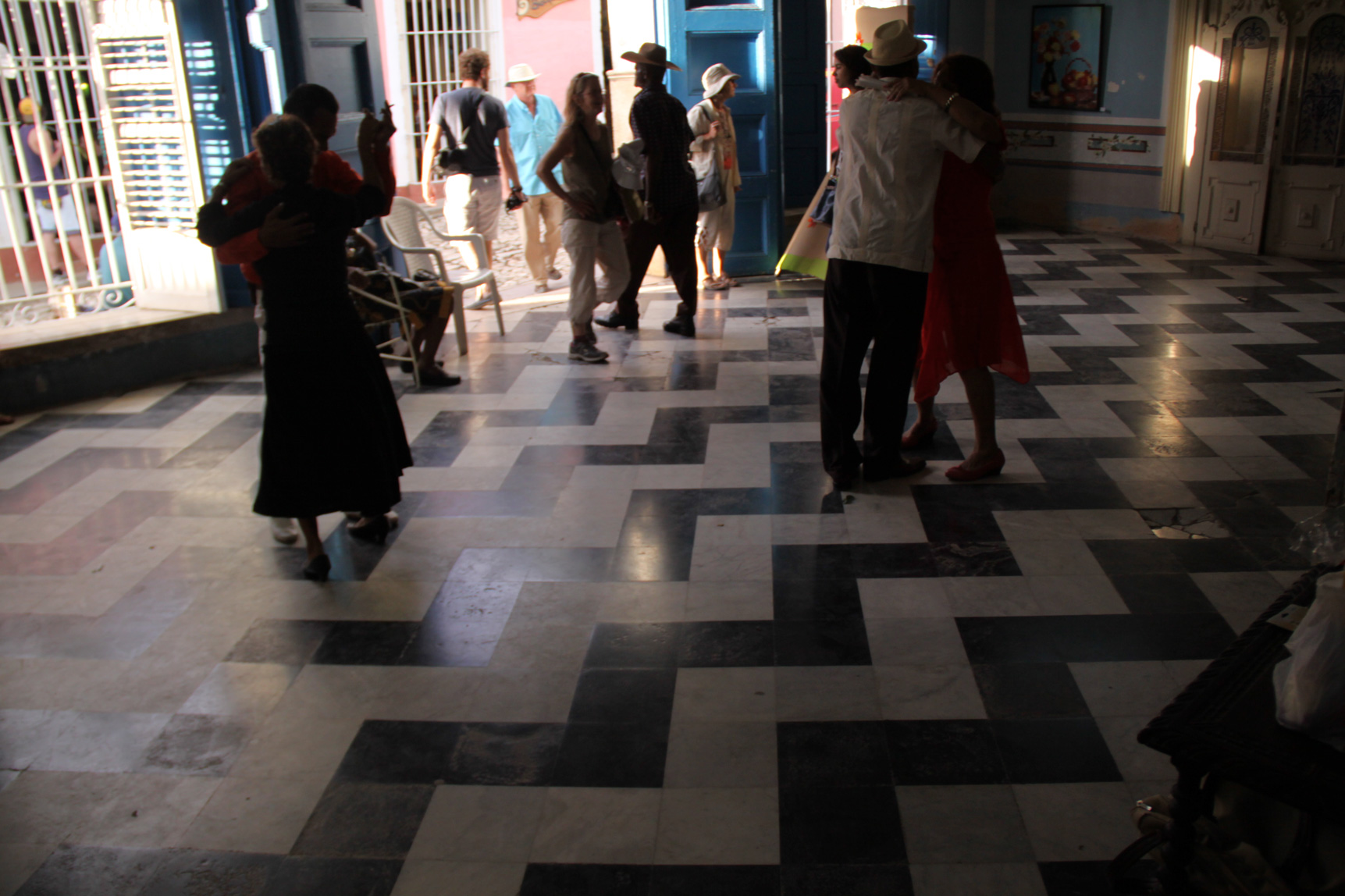
Dancing in the Music Salon in Trinidad
Instruments were everywhere, predominantly guitars and the all important percussion. I had not realised how important percussion was in Latin music and Cuba was no exception. The sight of a nine piece band crammed into a hole in the wall type bar will never leave me, with nearly half of the band assigned purely to percussion. The instruments like clave and cowbell by themselves are nothing special, but when assembled together they produce a tapestry of rhythm which is essential to any Cuban music.
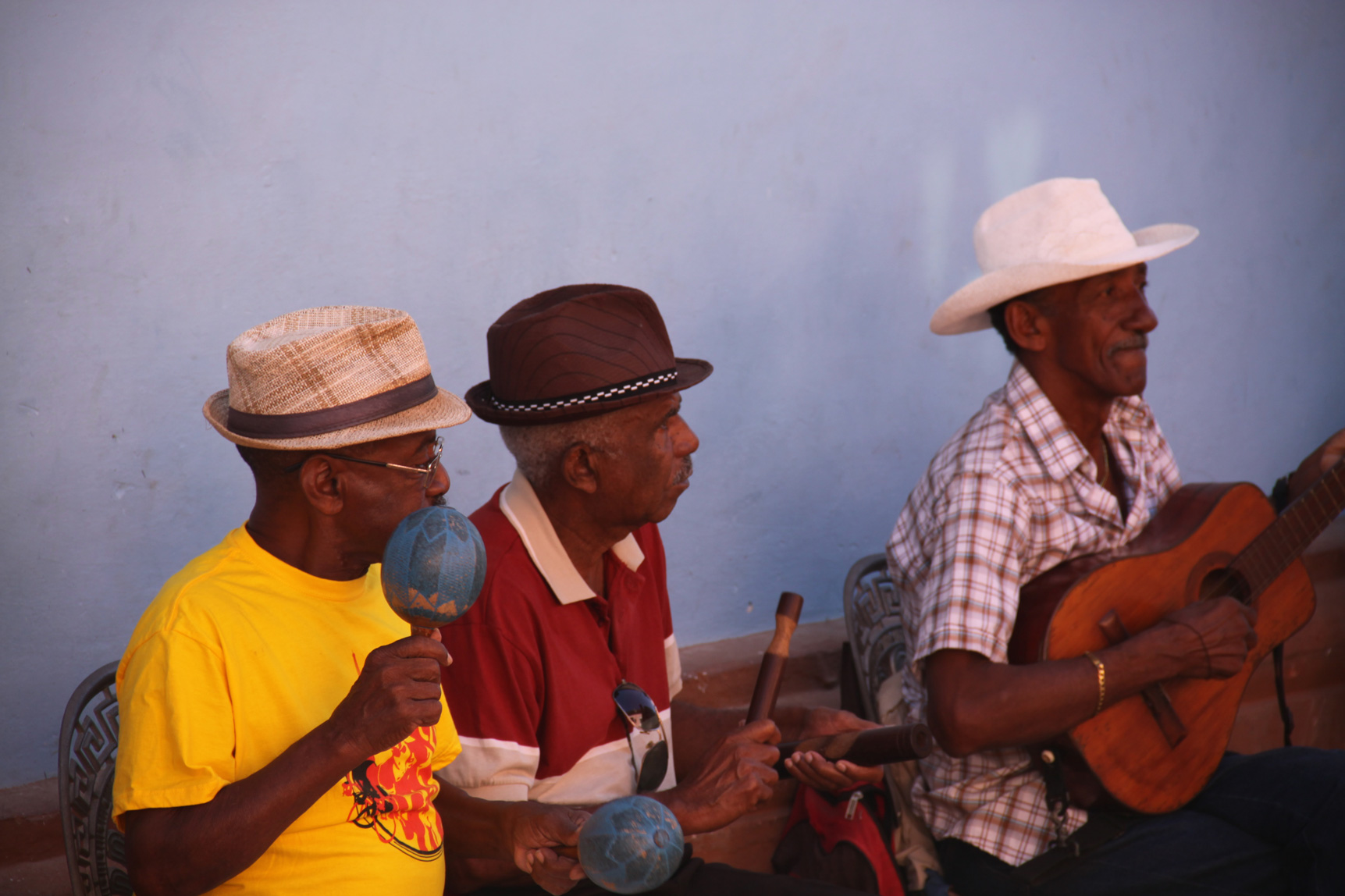
Musicians in Cuba
Pianos were not widely seen during our trip. During our stay at the town of Trinidad in the south part of the island, we discovered a dance hall with an old grand piano shoved in the hallway. It was the only one of two pianos we saw the whole trip and I did not dare to try it out, so worn out it looked. As the afternoon dance class whirled about us in the old dancehall, I pondered why a country with so much music could have so few pianos on show.
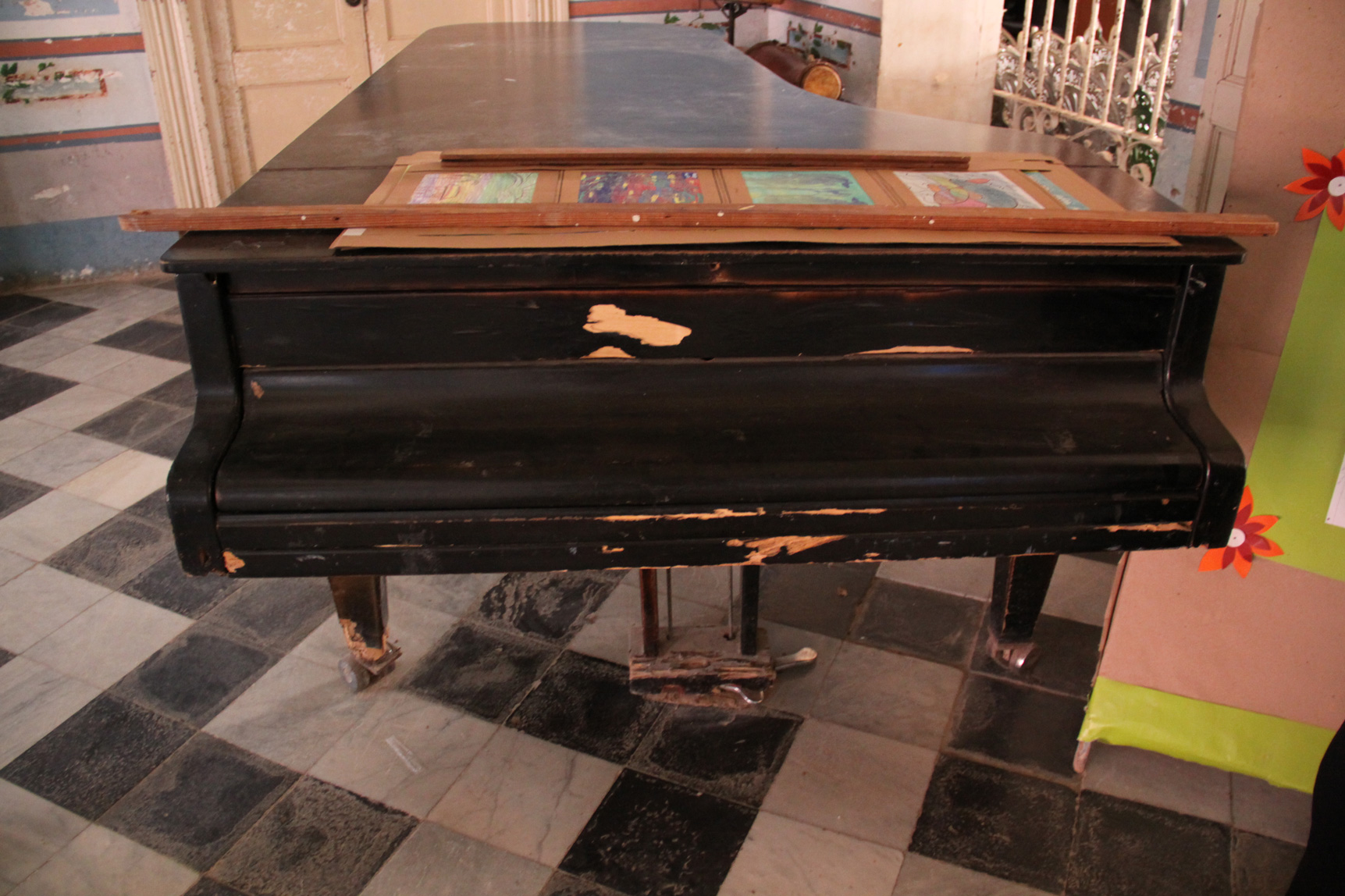
Grand piano in Trinidad, Cuba
Pianos are expensive instruments and for a country that was under trade embargo and where nominal personal incomes are restricted, it is easy to understand how few people would be able to make such a purchase. The weather is another important factor, where continual warm spells and humidity would make the maintenance of such instruments very labour intensive. In addition, there would be no source for new parts for repairs. The effect of trade embargoes was to force Cubans to develop a culture of make do, creating parts and spares from older items and scrap. The guitars of Cuba are an example of a whole mini industry being created where small workshops developed methods for winding old metal wires to create guitar strings. I couldn’t see any evidence that this extended to the complexity of a piano action, but I hope to be corrected! If you ever go to Cuba, take a few packets of guitar strings with you to exchange for goods, you’ll make many friends from such a luxury.
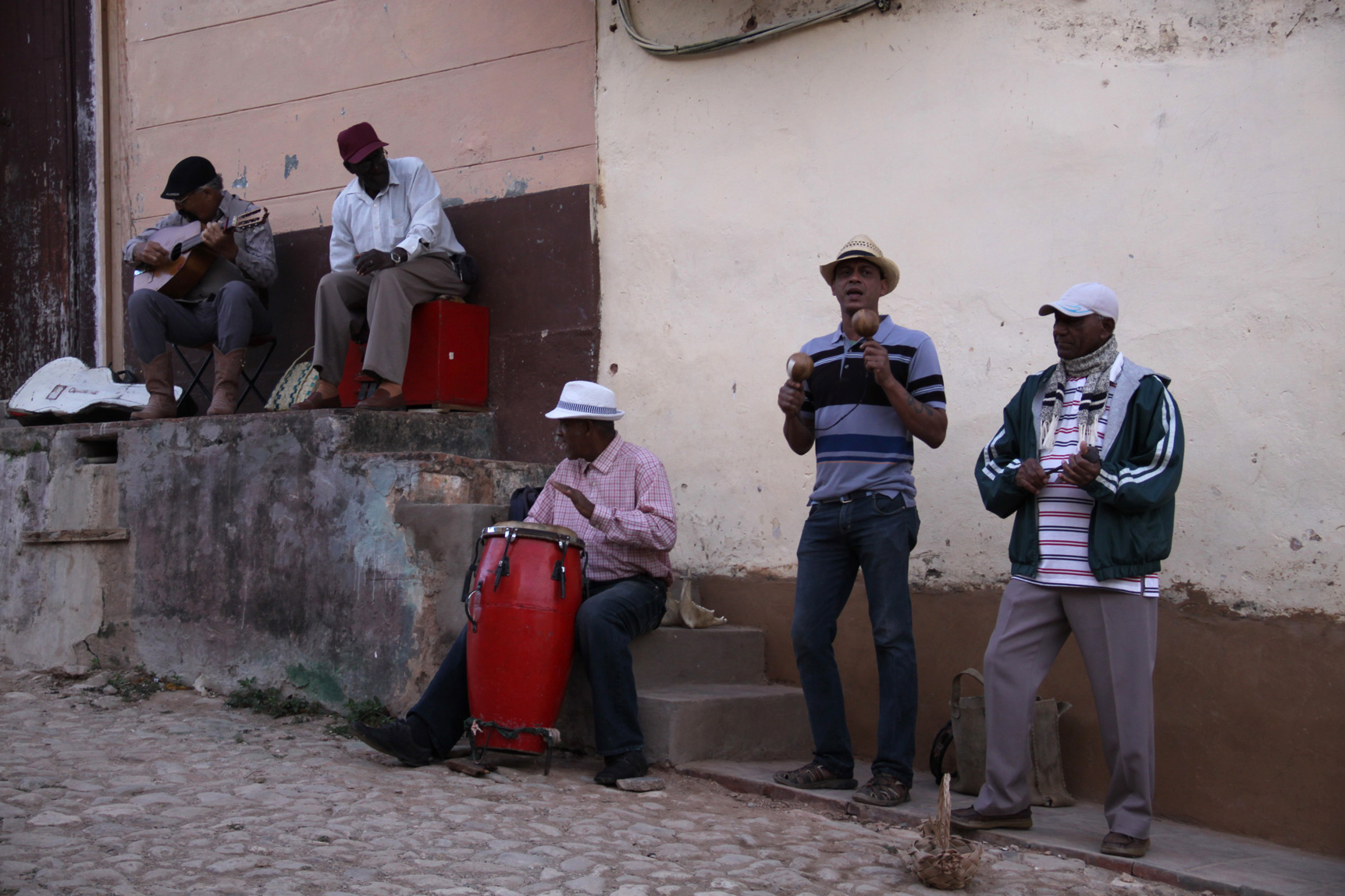
Musicians in Trinidad, Cuba
In the capital of Havana we came across the other piano we saw on our trip, a Petrof grand in the Museum of the Revolution. Before the Revolution, this grand building used to be the presidential palace and it was this very building that the revolutionaries dramatically stormed in 1957, with the intent of killing the ruling dictator Batista. Bullet holes still lined the hallways and gave a stark reminder to the inherent violence of any revolution.
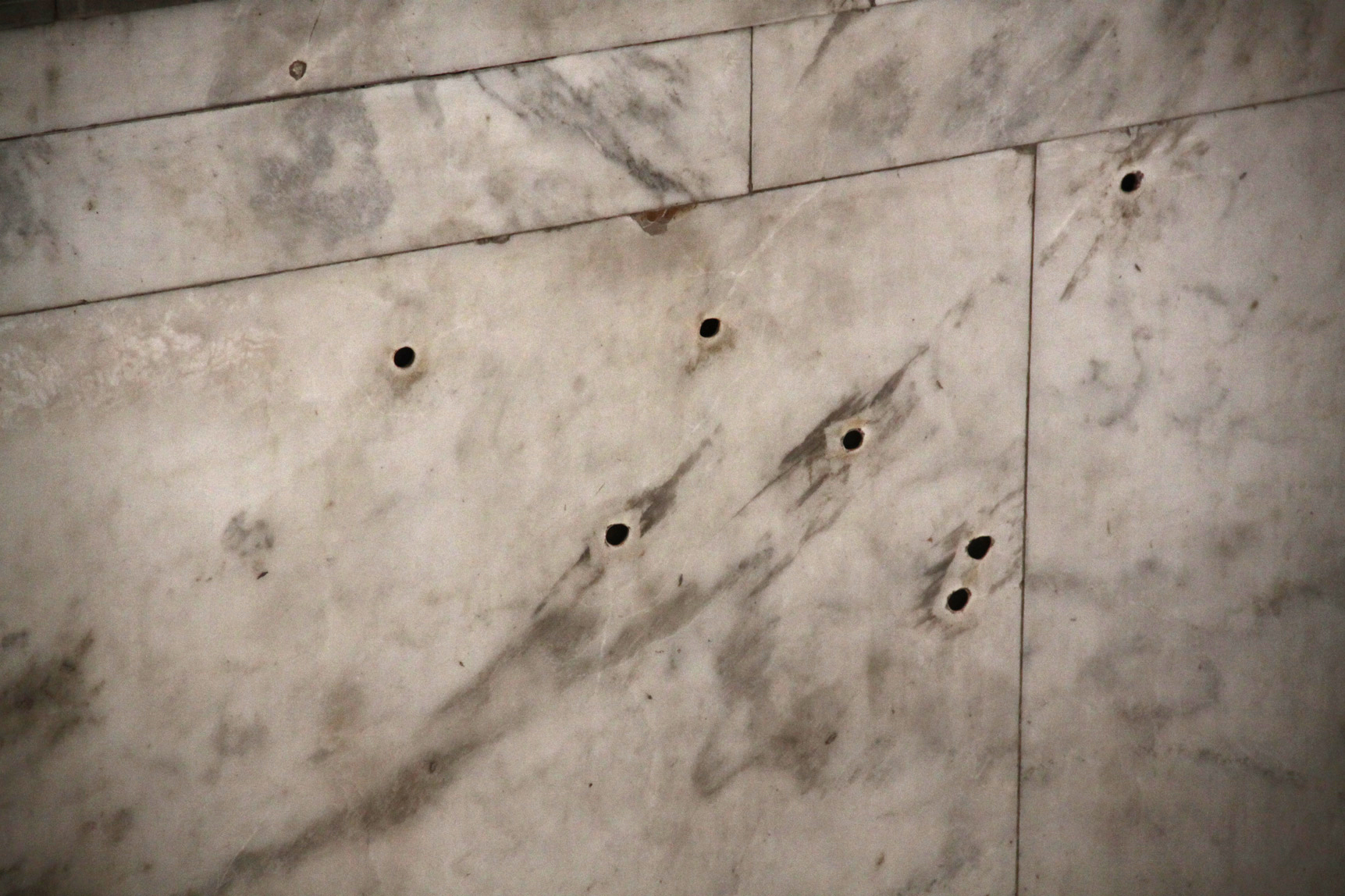
Bullet holes in the Museum of the Revolution
The piano itself very much looked like a 1920’s grand piano and it was easy to imagine the glamorous functions being held there for dignitaries while piano music drifted through the palatial rooms.
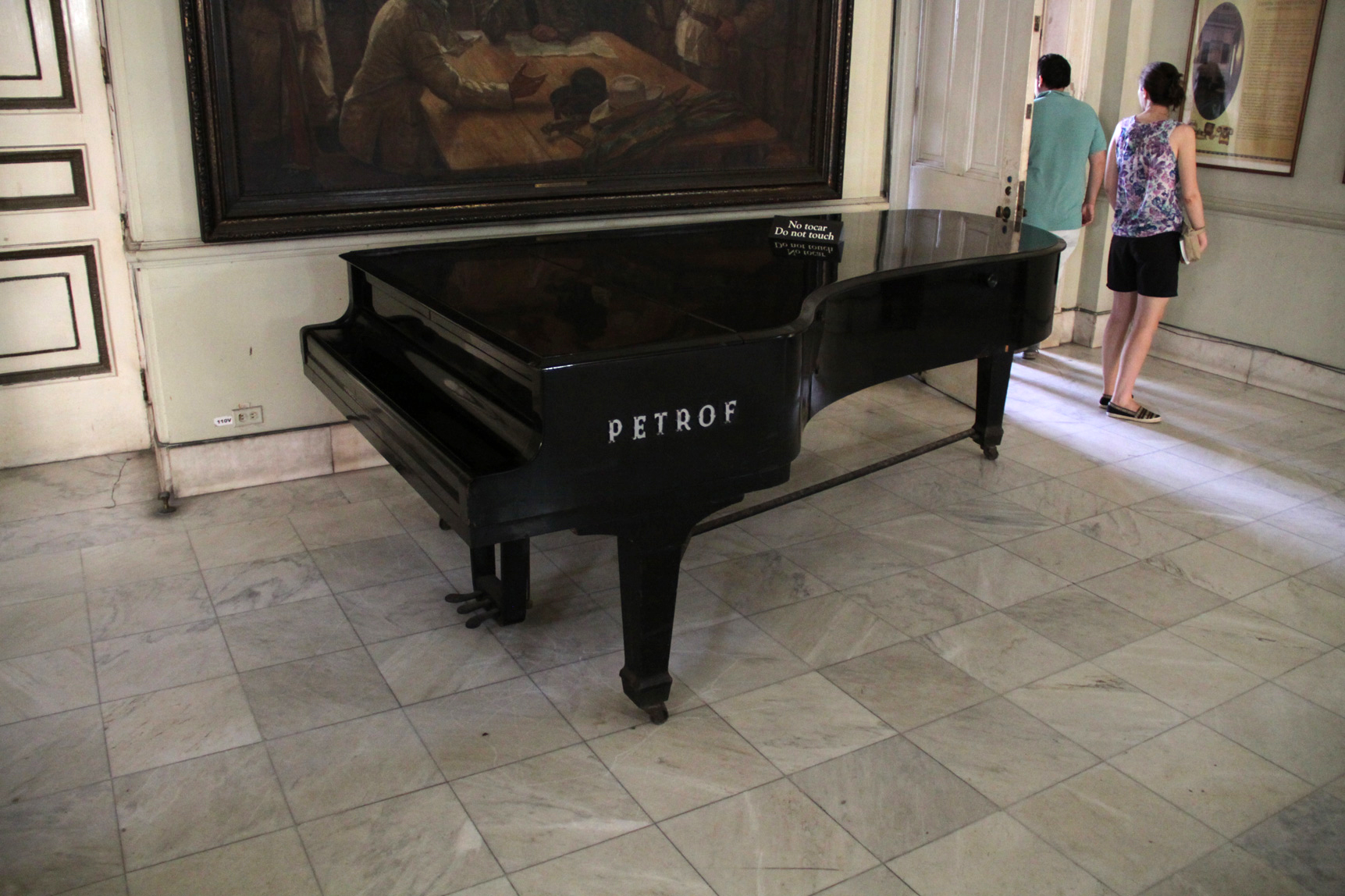
Petrof piano in the Museum of the Revolution, Cuba
Today the museum is a dry exhibit of propaganda for the Castro regime. Endless statistics about the success of the agrarian reforms of Castro’s government and the evil of the U.S made it difficult to stay awake as we passed from room to room. Perhaps the most poignant part of the museum was a grand ballroom that had been designed as an imitation of one of the great rooms of Versailles. The enormous wealth that must have been expended on that room alone, while the Cuban people were ripped off and descended into prostitution, drugs and gambling rackets, tells you how little propaganda Castro actually needed to get the Cuban people on his side. Batista evidently was doing the work for him.
And so to the title of this article, to a statue of Chopin located in the Plaza de San Francisco de Asis in Old Havana. As we walked across the plaza I recognised the profile of the man sat on the bench straight away: the sculptor did a very good job!
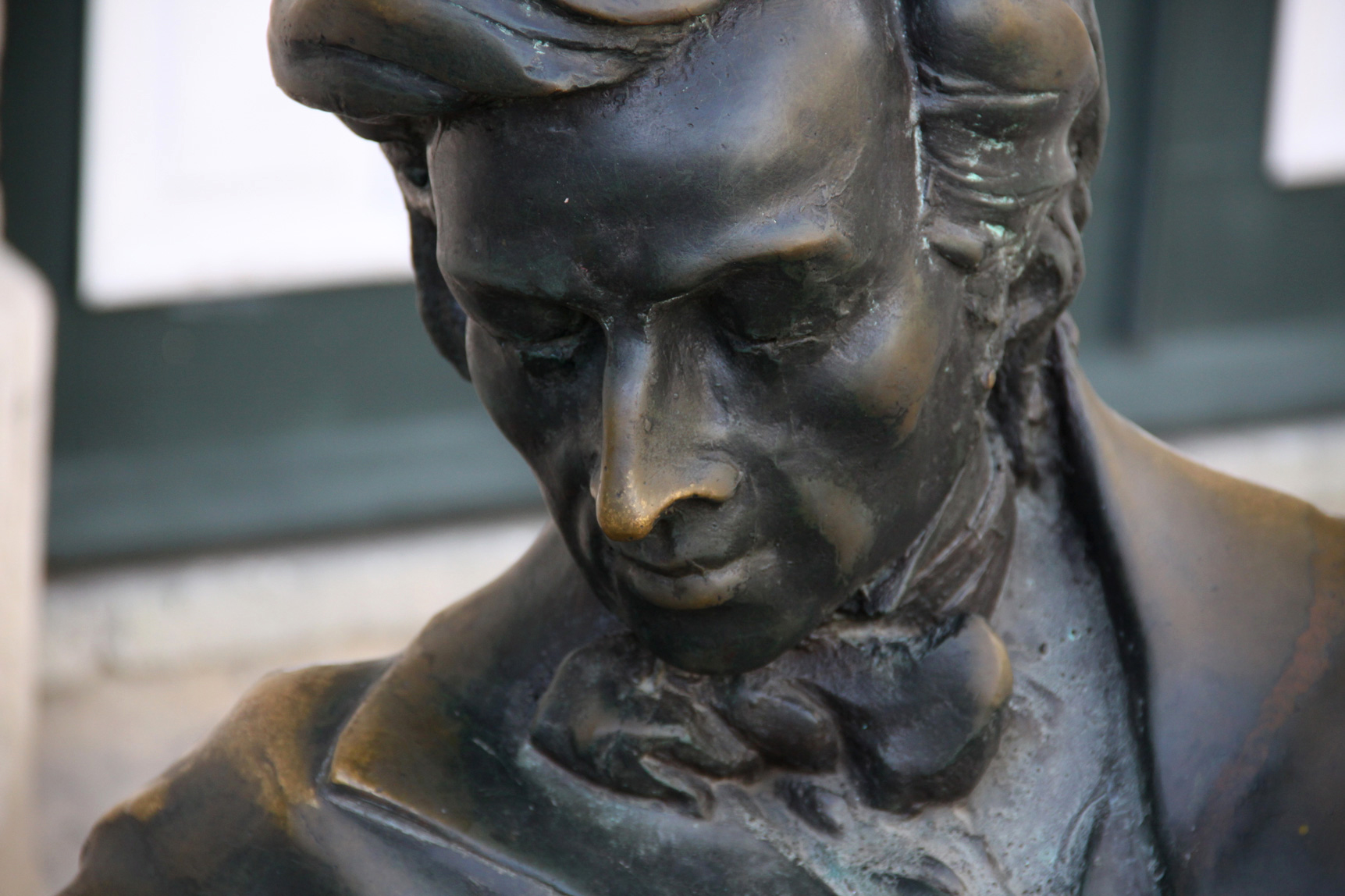
I wondered how many people taking their photos with the elegant dressed gentleman knew who he was and the music he created, but in many ways it didn’t matter. The serenity and ease of his pose on the bench perfectly fitted in with the Cubans sitting in the square, taking a momentary break from their work to watch the world go by.
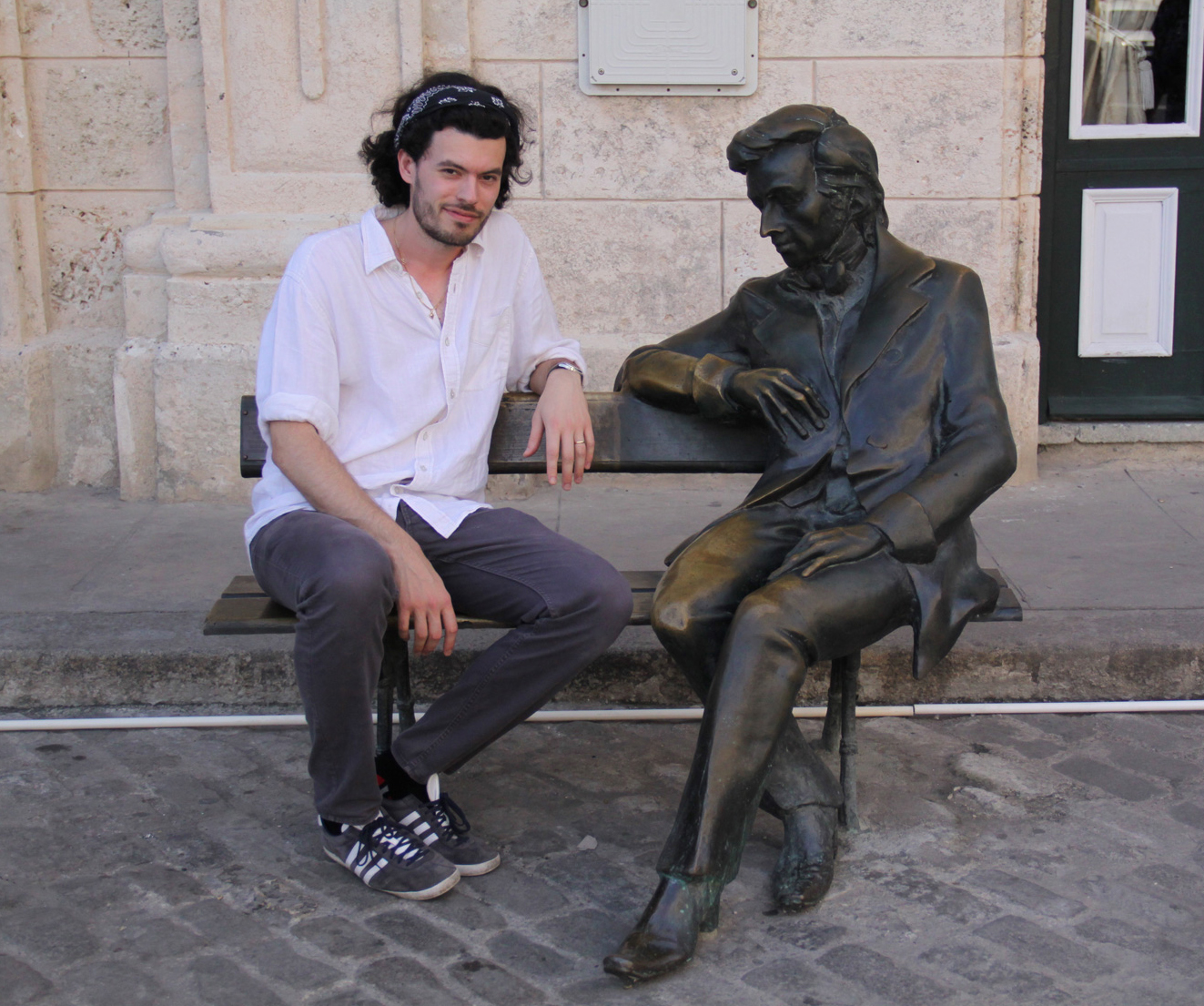
A statue of Chopin in Cuba and I
The statue was the work of sculptor Adam Myjak and was the result of a collaboration between the Cuban and Polish governments to celebrate Polish culture and the bicentenary of Chopin’s birth. Chopin himself of course never went to Cuba. But I believe he would have easily related to the feelings of national pride that Cubans feel today for their country. Just as Cuba had been occupied by the Spanish, in Chopin’s lifetime Poland was a country forcibly annexed to Russia. Poland as a country legally did not exist. Chopin wrote music specifically to stand in defiance of Russian rule. His Mazurkas and Polonaises ensured that whatever the military and political situation, the essential voice of Poland’s spirit would resound for centuries after in people’s hearts and minds.
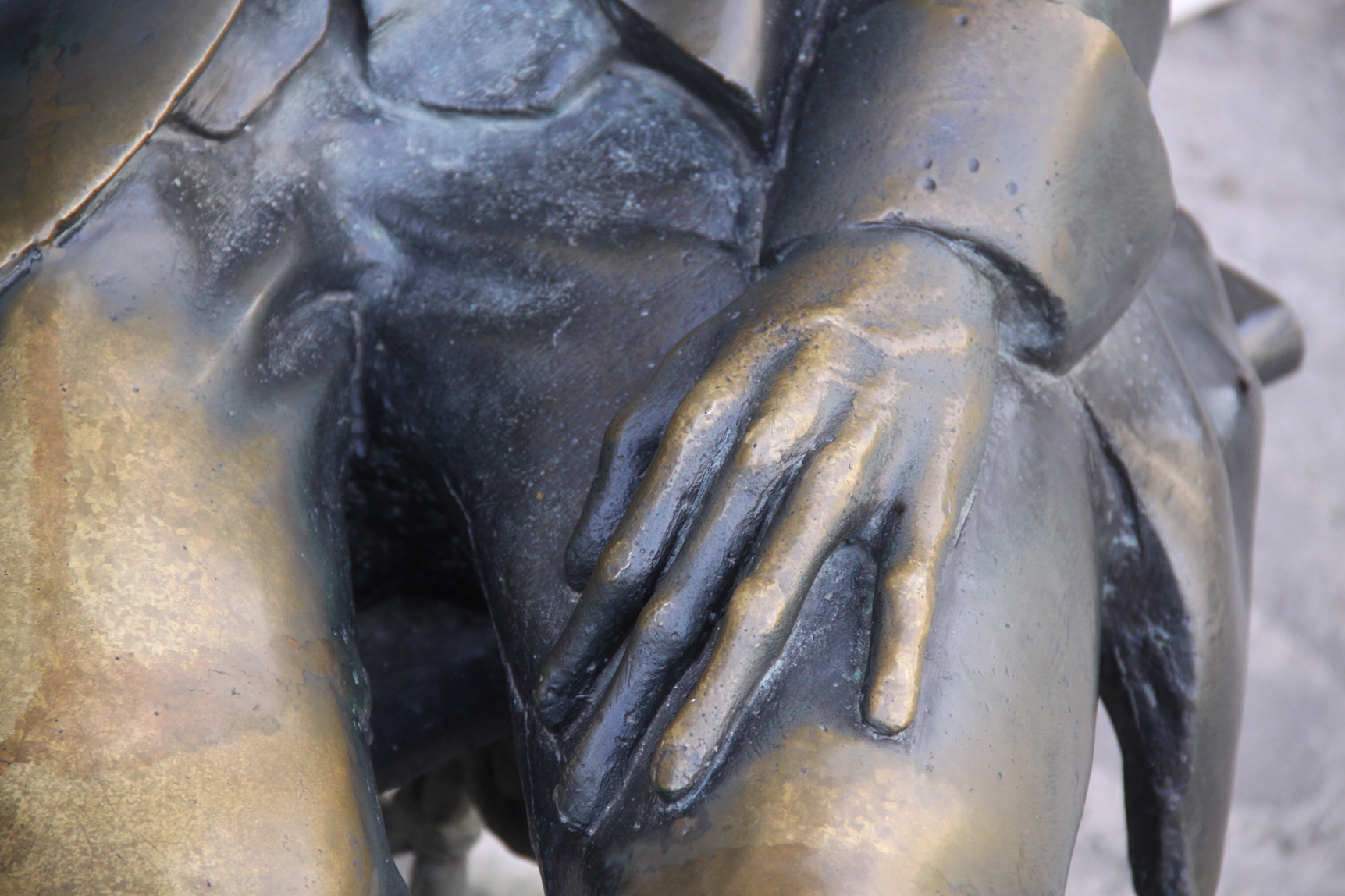
Chopin’s hand
During our trip we spoke to many young Cubans who could not wait for progress and change, eagerly awaiting the the doors of President Obama’s rapprochement to be opened a little bit wider. But the Cubans we spoke to, young and old, were also intensely proud of their revolutionary history. This did not equate to love for Fidel Castro, in fact some people were surprisingly forthright about the anger held, especially during the ‘Special Period’. But for them it was possible to be proud of the independence Cuba had as a result of the revolution, while also acknowledging the many faults of Castro’s leadership.
It is simply impossible for anyone born in another country to understand the effect of Cuba’s history has on its people. In the U.K. for example, there is a classroom history of great victories in battle and imperial domination of the world: the Spanish Armada, the British Empire and her colonies, defeating Napoleon, defeating Germany, the list goes on. The effect this has on the national psyche is I believe one of the most under researched parts of history. It continues to have a profound effect on political arguments in Westminster and in the national public conversation.
But Cuba’s history is the diametric opposite. It is a long history of invasion and interference, first by the Spanish and then the U.S. The U.S in fact did propose to buy Cuba in 1854 with the intention of creating another slave state to the union. How is that even conceivable? How would today’s Brexiteers react if the EU came out with a plan to purchase the U.K? The history of Cuba goes a long way to explain the pride people still have for Castro’s revolution and the clear cut independence it brought to the people of Cuba. The cost of that independence for the people of Cuba, when trade embargoes drove people to famine in the 1990’s, is highly questionable and the extent to which Castro made little attempt to alleviate his people’s suffering will tarnish his legacy. But there was no doubt that the revolution created a pointed end to external state interference and a new beginning of a true Cuban independence.
My trip to Cuba left me with many questions and a desire to find out more about this incredible country. Cuba is a unique country for the geographic position it holds between central and south America, being the largest island in the Caribbean. It has a long history of being invaded and occupied, either by direct military or economic occupation. It became a truly independent state after the Cuban revolution of 1959 and the talking point of the world as an openly Communist state sitting in the Florida straights. This island in the Caribbean effectively threatened the humanity of the world with the Cuba missile crisis, but later became known for peacekeeping missions in countries like Angola. During the trip I happened to be reading Nelson Mandela’s autobiography and was surprised on the number of references to Cuba. On 26 July 1991, Nelson Mandela delivered a speech in Havana praising the intervention in Angola,
‘The Cuban people hold a special place in the hearts of the people of Africa. The Cuban internationalists have made a contribution to African independence, freedom and justice unparalleled for its principled and selfless character – We in Africa are used to being victims of countries wanting to carve up our territory or subvert our sovereignty. It is unparalleled in African history to have another people rise to the defence of one of us – The defeat of the apartheid army was an inspiration to the struggling people in South Africa!’
These other sides of Cuba’s post revolutionary history are never widely publicised, could it be because they work against the mainstream narrative of a corrupt communist state? We are told that Cuba’s poverty and the lack of democracy means that the Cuban people are forever living on the edge, unable to cope against a wall of government suppression. But what we found were a people who were not only coping but vibrant and curious about the rest of the world. This does not make one an apologist for the government suppression and ongoing lack of democracy. Things must change and I felt the desire of this from the people we met. Everyone there had an anticipation of progress to come.
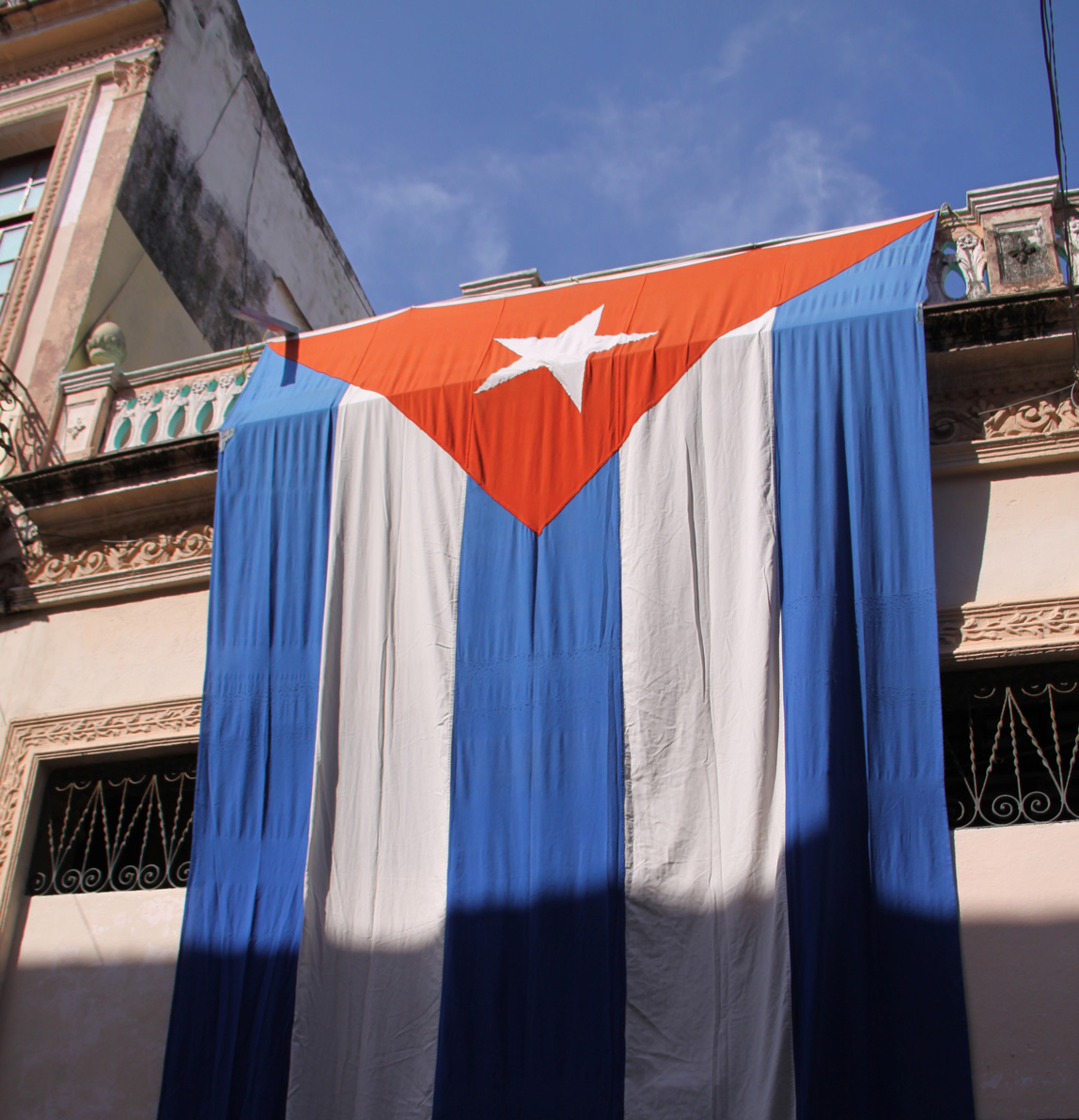
The Cuban Flag
My final thought relates solely to the Cuban people and their inherent vibrancy. Their music, dance and zest for life was infectious and gave the country a sense of optimism that far outstrips its economic wealth. These people have no democracy and small incomes, but that did not hinder their wonderful warmth that they shared with us freely. Commentators in the U.K often like to compare Cuba economically to countries in the G7 as a fair comparison. But this comparison is not fair in anyway. A country like the U.K can in no way be compared fairly to a country like Cuba. The U.K has a long history of being one of the most powerful countries on the planet and massively benefitting from the wealth and freedom that this confers. On the flip side I have met people in U.K who have the vote but are completely uninterested in using it. They live in a country that is economically one of the fastest growing in the G7, and yet they have no sense of feeling like they are sharing in this success. Economic success is not the only means for giving people a sense of national pride and contentment.
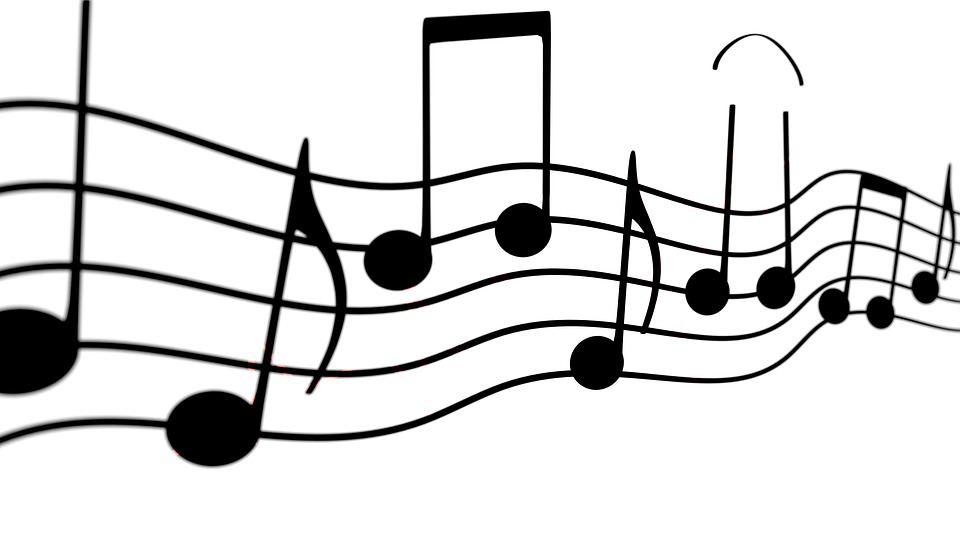
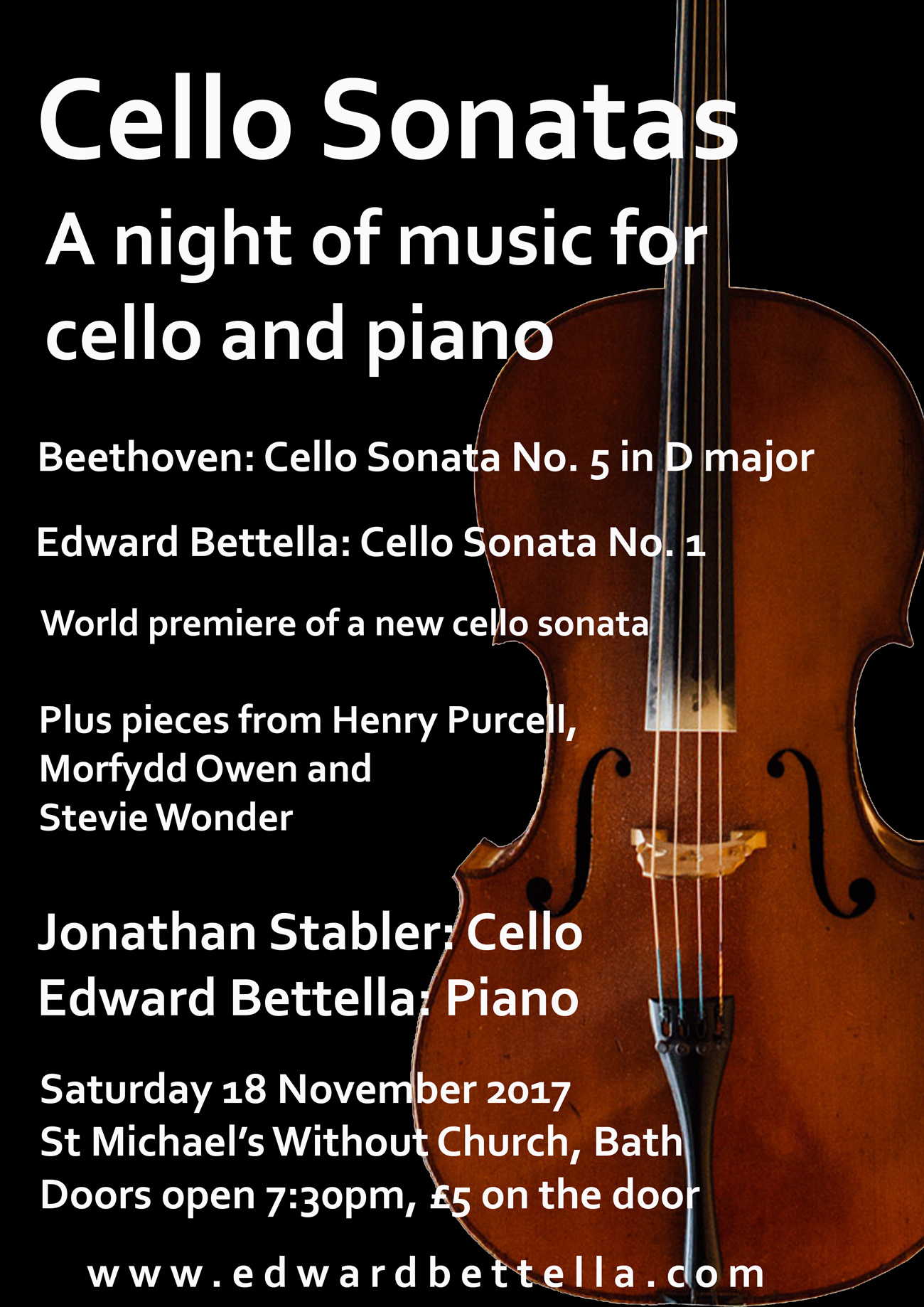










Recent Comments